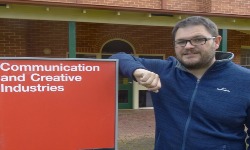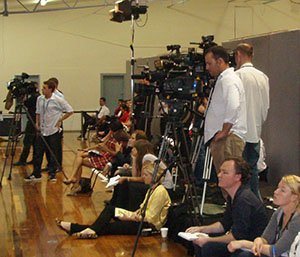* Journalism helps us understand the world and our place in it
* Without commitment to facts, public institutions risk becoming playthings for the powerful
* CSU journalism degree enrolments still open and scholarships available

Students applying for a regional journalism scholarship need to be enrolled in the Bachelor of Communication (Journalism) or the Bachelor of Communication (Journalism and International Studies) in the CSU School of Communication and Creative Industries.
Course director for Communication and Creative Industries in the CSU Faculty of Arts and Education Dr Travis Holland (pictured left) said the Regional Journalism Scholarship Program is administered by CSU on behalf of the Australian Government.
“The scholarship is designed to assist regional first-year students studying journalism degrees to acquire the skills and knowledge necessary to operate effectively as journalists in the contemporary news media industry, and be job-ready at the completion of their studies.
“This scholarship is based on the level of academic or educational achievement, as well as the financial need, of the applicant.”
Applications for Commonwealth Government regional journalism scholarships opened on Friday 22 February, and close on Sunday 24 March.
 Senior lecturer in journalism in the CSU School of Communication and Creative Industries in Bathurst Mr Chris McGillion says what is reported and how, and what’s not reported and why, impacts how we view and understand the world and our place in it.
Senior lecturer in journalism in the CSU School of Communication and Creative Industries in Bathurst Mr Chris McGillion says what is reported and how, and what’s not reported and why, impacts how we view and understand the world and our place in it.
“We live in an era when beliefs – including prejudices, superstitions, misperceptions and straight out quackery – seem to dominate so much of public debate and political behaviour,” Mr McGillion said.
“At its least, this can produce bad policy responding to opinion polls rather than to facts; at its worst, it can produce communities in which people are resentful of each other and fearful of everyone else.
“We can see our democracy under stress with the rise of ‘fake news’ – manipulating people’s attitudes to set and control agendas – and our private lives threatened by data theft, turning our personal information into a currency of exchange.
“Donald Trump’s America is only the most obvious example with a deeply polarised electorate and increasingly fortress mentality toward the rest of the world.
“But by degrees the same trend can be seen in Europe, Britain, and Australia.
“What is reported and how, and what’s not reported and why, each of these impact on how we view and understand the world and our place in it.
“Perhaps never before has the media wielded so much power to influence what we think, how we live, and to what ends.
“Without a commitment to the facts and to the common good in reporting them - what used to be called ‘speaking truth to power’ – even our public institutions risk becoming the private play things of particular interests all much more powerful than citizens themselves.
“This creates a challenging role for journalism and also a vital time to be a journalist.
“The feint-hearted need not apply.”





Social
Explore the world of social